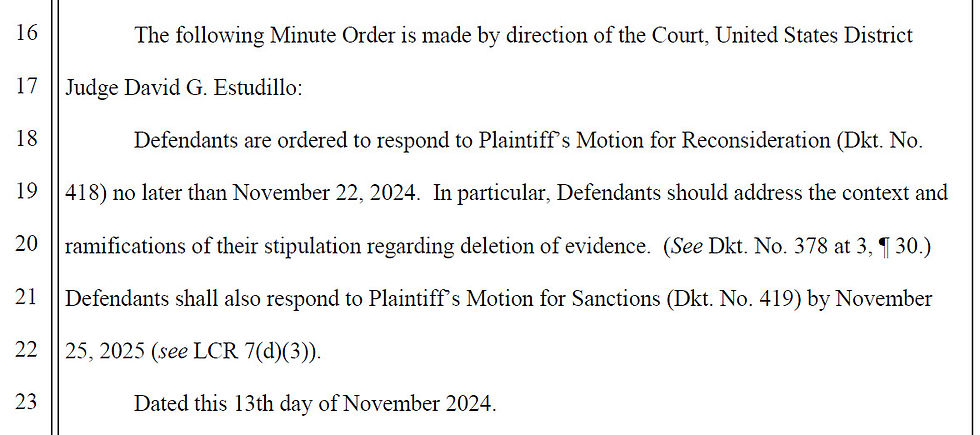Telemarketer set to learn the hard way frivolous counterclaims have no place in court
- Peter Schneider

- Nov 13, 2024
- 5 min read
Updated: Sep 7, 2025

In a telemarketing lawsuit I've been watching for a while, case Barton v. Delfgauw, 3:21-cv-05610 in the Western District of Washington is setting up for a dramatic ending. The Court paints the scene in Dkt. 416: This is a long running action under the Telephone Consumer Protection Act (“TCPA”).
Plaintiff alleges that Defendants sent marketing text messages to his phone despite its listing on the Do Not Call registry, in violation of the TCPA. Defendant Joe Delfgauw and co-defendant entities under his control Xanadu Marketing Inc. and Starter Home Investing Inc. answered with a counterclaim alleging fraud and “fraud by nondisclosure.”
The nature of the allegation has evolved over the course of the litigation, but as it stands now: Counterclaimants allege that Barton used the identity of another individual, Ivette Jimenez, to opt-in to text messages. Plaintiff Nathen Barton is a serial TCPA litigant, proceeding pro se, and the crux of the counterclaim is that Barton is fraudulently manufacturing TCPA claims to make money.
Following that denial of summary judgement, the parties began preparing for trial. As relevant here, among those preparations was that the parties submitted Joint Stipulated Facts. Those stipulated facts include significant concessions by Defendants.
Plaintiff filed a Motion for Leave to File a Dispositive Motion seeking to file a renewed motion for summary judgement on the counterclaim, largely on the basis of the stipulations. This Court granted leave to file the renewed motion, observing that the stipulated facts “cast doubt on Defendants’ ability to continue pressing their counterclaim.”
Because the Court believes that the joint stipulations and Defendants’ admissions will make it impossible for Defendants to carry their burden of proof on their counterclaim at trial, the Court GRANTS the motion for summary judgement.
Again, this is just painting the opening scene. What happens when a telemarketer files a counterclaim, pursues it for three years, and right before trial admits it was meritless? For one thing you invite a motion for sanctions under 28 U.S. Code § 1927 for excessive costs which is what plaintiff Nathen Barton did here:
I love the opening to the motion!
On 9/23/2021 Barton sued the Defendants for unwanted phone calls. The Defendants retained Donna Gibson and countersued for fraud and fraud by non-disclosure. Dkt. 20. After a lengthy court battle spanning three years, over 416 docket entries, and something like six in-person court hearings, on 11/1/2024 the Court disposed of both, finding that “fraud by nondisclosure” . . . “involves failure to disclose defects in real property” and their fraud claim failed 55.6% of the 9 elements – the 1st, 3rd, 4th, 5th, and 6th – with whiffs on the 8th and 9th.
Gibson knew the counterclaims were frivolous in 2021, and she unreasonably and vexatiously multiplied the proceedings in the case pursuing them. This motion asks her and her clients to compensate Barton and the Court for the resulting excess costs and expenses incurred as allowed under 28 U.S.C. §1927 and the Court’s inherent power.
Both standards are met here. The Court dismissed their fraud counterclaim over five missing elements and two whiffs. How could an attorney in good conscience file a two-count counterclaim – and litigate it to the eve of trial – when one is missing more than half the required elements and the other one is premised on a Minnesota law?
The bottom line is, lawsuit should have some factual and legal underpinning to even get started. What is required of lawyers, however, is that they inform themselves about the facts of their clients' cases and the applicable law and determine that they can make good faith arguments in support of their clients' positions. In re Girardi, 611 F.3d 1027, 1036 (9th Cir. 2010). Failing to do that opens you up to sanctions under §1927.
. . . it is plainly clear that "a finding that the attorneys recklessly raised a frivolous argument which resulted in the multiplication of the proceedings" justifies § 1927 sanctions . . . Bad faith is present when an attorney knowingly or recklessly raises a frivolous argument . . . We have characterized frivolous arguments for the purposes of § 1927 sanctions as ones that are "baseless and made without reasonable and competent inquiry" or made up of "legal or factual contentions so weak as to constitute objective evidence of improper purpose." . . . an argument is patently lacking in any basis in either law or fact, it can be fairly characterized as "frivolous" for the purpose of a § 1927 sanction award . . . As Hagans himself acknowledged, as an attorney for THP, it was his responsibility to ensure the veracity of the arguments he was approving on the company's behalf. Caputo v. Tungsten Heavy Powder, Inc., 96 F.4th 1111, 1155 (9th Cir. 2024)
and under the court's inherent power:
The Court may utilize its inherent authority to assess attorney fees when a party has “acted in bad faith, vexatiously, wantonly, or for oppressive reasons.” Id. at 766 (internal marks and citation omitted). Unlike Section 1927 sanctions, inherent power sanctions require more than just mere recklessness. See, e.g., Fink, 239 F.3d at 993-94. However, recklessness “combined with an additional factor such as frivolousness, harassment, or an improper purpose” allows a court to exercise its inherent sanctioning power. Hilliard v. Twin Falls Cnty. Sheriff's Office, 1:18-cv-00550-CWD, 7 (D. Idaho Mar. 29, 2024)
Litigation properly started can turn frivolous when the result appears obvious, or the arguments are wholly without merit. Galen v. Los Angeles, 477 F.3d 652, 666 (9th Cir. 2007) and a party can be sanctioned if it continued to litigate after it clearly became so. Christiansburg Garment Co. v. Equal Emp't Opportunity Comm'n, 434 U.S. 412, 422 (1978). The text of §1927 mentions multiplying litigation, but it also applies to making proceedings that would have happened anyway more difficult or time consuming. The court’s inherent powers and §1927 also apply to tactics once a lawsuit has begun. In re Keegan Management, Securities Litigation, 78 F.3d 431, 435 (9th Cir. 1996).

All parties should keep this in mind before starting litigation, or if they find their case evaporates during litigation they should end it themselves to avoid a §1927 punch back.
The Delfgauw court basically found that after three years of litigation, Delfgauw's counterclaim was completely meritless.
That isn't the same as frivolous, but if Joe Delfgauw's countersuit was or turned frivolous, Barton very likely got the court's full attention with his opening line
After a lengthy court battle spanning three years, over 416 docket entries, and something like six in-person court hearings, on 11/1/2024 the Court disposed of both, finding that “fraud by nondisclosure” . . . “involves failure to disclose defects in real property” and their fraud claim failed 55.6% of the 9 elements – the 1st, 3rd, 4th, 5th, and 6th – with whiffs on the 8th and 9th.
That's a lot of time invested by an overworked court and they won't appreciate finding out a 400+ court docket was all a farce and this judge doesn't sounds like he's ready to let it go.

Depending on the situation, attorney fees can be enormous. Million dollars plus on big cases spanning years and hundreds of court dockets. If your case doesn't have solid factual and legal support, get rid of it on your terms before the court does it for you!
How will this case end? Stay tuned as we all find out!
Are telemarketers harassing you in Washington, Oregon, or Montana? My Washington State TCPA plaintiff law practice can help, just give us a call at 206-800-6000 or email peter@nwdebtresolution.com.
The thoughts, opinions and musings of this blog are those of Peter Schneider, a consumer advocate and Washington State plaintiff's TCPA attorney at Northwest Debt Resolution, LLC. They are just that, his thoughts, opinions and musings and should be treated as such. They are not legal advice. If you are looking to file a lawsuit for TCPA violations and unwanted calls please contact me for a consultation.



Comments